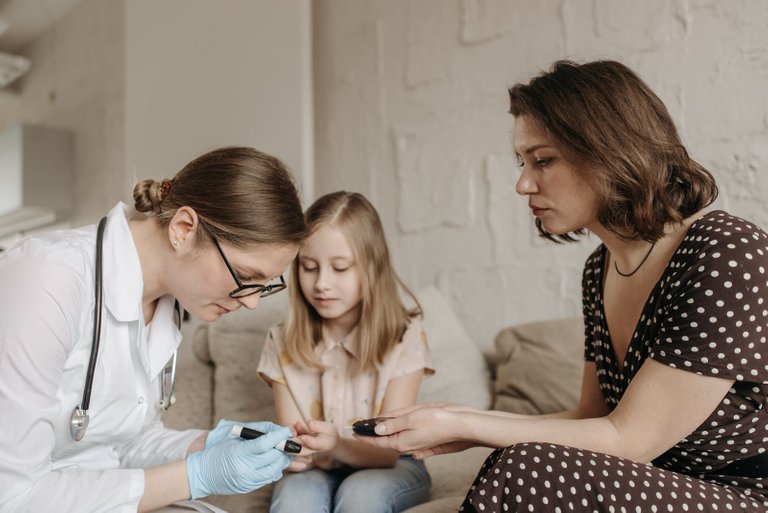Is it possible to avoid diabetes?
I wrote about my Mum being diagnosed with a diabetic condition some time ago, it came as a shock to me because she doesn't consume sugar at all, so, that post was an analysis on the relationship between sugar intake and diabetes. However, after frequenting the hospital with her for check-ups and treatment, I got to see other diabetic patients who have different conditions from my Mum's, and of course, I am here to describe my experience with you, as usual, this is going to be a very long ride in the description of diabetes, so, grab your drink friends.
Diabetes mellitus is also called diabetes, diabetes is a general name that houses various conditions that describe how the body converts food into energy.
When carbohydrate is consumed, the body naturally turns the consumed carbohydrate into sugar, known as glucose, then sends this glucose into the bloodstream.
In a diabetic condition, the body either stops producing sufficient insulin or stops producing insulin on a totally different level, in some cases, both situations happen at the same time. Diabetes comes in different types and forms, some types of diabetes are even from childhood, but the most common types of diabetes are; type1, type2, and gestational diabetes. 1

pexels
Let's Start with Type 1 Diabetes.
Type 1 diabetes is an autoimmune reaction, in this case, the body unintentionally attacks itself and destroys the beta cells in the pancreas responsible for the production of insulin, this attack of course, permanently alters and completely stops the production of insulin in the body. The main cause of this attack is still not really clear at the moment, but it could be a result of genes or environmental factors. This type of diabetes is the most common type of diabetes that exists, it is often diagnosed in teens, children, and even young adults.
Those with type 1 diabetes, could notice symptoms like; weight loss, extreme fatigue, increased thirst on a new level, appetite is also increased, and frequent urge to urinate.
Even if the possible causes of type 1 diabetes are still unknown, family history and age are very common possible reasons for Type 2 diabetes. Those who have parents or siblings who have type1 diabetes, stand a very great chance of having type 1 diabetes too, although the diagnosis of type 1 diabetes are common in children, it can develop at any age.
The intake of insulin through injection, helps those with type 1 diabetes manage their condition, asides from insulin intake, there are other lifestyle practices that could help manage this condition;
- Being active physically.
- Consuming balanced meals.
- Controlling cholesterol and blood pressure.
- Having a good sleeping hygiene. 2

pexels
Not controlling type 1 diabetes appropriately, could result in some types of health complications like; nerve damage, cardiovascular disease, high blood pressure, stroke, skin infection, kidney problem, foot problems, ketoacidosis, and even eye problem.
Prediabetes.
Prediabetes is a health condition where blood sugar levels are at a higher level than they should be, but the rise in blood sugar level, in this case, is not high enough to be diagnosed with diabetes. Those with prediabetes, stand at a greater risk of developing type 2 diabetes.
Those with the possible chance of developing type 2 diabetes are people;
With a family history of being diabetic.
With a family history of high blood pressure.
People who are overweight.
People who live a sedentary lifestyle.
People who are over 45 years of age.
Those with a history of polycystic ovary syndrome (PCOS).
Maintaining healthy lifestyle habits could help prevent prediabetes from transforming into type2 diabetes.
Type 2 diabetes is not so bad and can even be managed from home, although some severe cases may require medical attention. Doctors would prescribe insulin injections, oral diabetes medicines, and some other injectable medications. The medications consumed, will go a long way in controlling sugar levels and preventing possible complications. Certain lifestyle changes could easily help prevent complications that can arise from this disease; being active, losing weight, and consuming healthy food.
Type 2 Diabetes.
Normally, the body produces insulin, the problem begins, when the body fails to use the produced insulin appropriately, this causes the pancreas to produce more insulin until it gets to the point where it cannot keep up with the amount produced, which causes insulin production to reduce and the aftermath is a rise in blood sugar level (high blood sugar).
Type 2 diabetes has the tendency to gradually increase over the years for a long time, most people do not even notice the symptoms in most cases, so a blood test is advised on a regular basis.
Those who stand a chance of having type 2 diabetes, fall within this category;
- The people who are obese.
- Having a history of a parent or sibling with type 2 diabetes.
- Being physically inactive.
- Being 45 years or older.
- Having prediabetes.
- A previous history of gestational diabetes.
Type 2 diabetes can create discolored patches in the skin around the neck and the armpit, it takes a longer time for type 2 diabetes to get diagnosed.
If type 2 diabetes is left untreated, it would result in some type of future complications like hypoglycemia. Hypoglycemia literally describes a rapid drop in blood sugar level. Those with hypoglycemia have these symptoms; sweating, extreme tiredness, irritability, sweating and shakiness, hunger, and feeling of nausea. 2
Gestational Diabetes.
This type of diabetes only happens during the period of pregnancy, it is common in people who have an initial case of diabetes or a family history of diabetes.
Weight gain and hormones during the period of pregnancy, make the body use insulin in a less effective way, this turns out to increase the body's need for insulin, it would take a medical history and risk factors for a medical expert to determine the possibility of gestational diabetes.
It is easy to identify a woman with gestational diabetes with some of these symptoms; blurry vision, excessively feeling thirsty and hungry, itchy or dry skin, feeling fatigued, and difficulty with a healing wound.
Gestational diabetes could occur as a result of some type of risk factors;
- Having a family history of type diabetes.
- Being obese.
- Previous cases of gestational diabetes.
- Having a baby who weighs over 9 pounds.
- Having a case of polycystic ovary syndrome.
To treat gestational diabetes, lifestyle changes have to be indulged, such as;
Having a healthy diet.
Monitor the baby closely during the period of pregnancy.
Regularly observing blood sugar levels.
An untreated case of gestational diabetes could result in one or two of these cases;
Excessive baby growth: In this case, extra glucose could cross the placenta, extra glucose then triggers the baby's pancreas to produce extra insulin, the extra insulin could make the baby grow too big, and of course, the difficulty would occur during childbirth and creates the need for a c-section.
Some mothers with gestational diabetes develop hypoglycemia shortly after birth.
When gestational diabetes isn't treated on time, it could result in the death of the baby, either before birth or shortly after birth.
3
How insulin functions in the body.
Insulin is a hormone in the body, the hormone comes from a gland found behind and below the stomach (pancreas). The pancreas is responsible for releasing insulin into the bloodstream, the insulin then circulates, and allows sugar to get into the cells, insulin also lowers the amount of sugar found in the bloodstream, a decrease in blood sugar level, makes possible for the secretion of insulin from the pancreas.
How glucose functions in the body.
Glucose is a source of energy needed for the cells that make up muscles and other tissues in the body. Glucose in the body comes from two major sources, which is the liver and food.
Sugar gets absorbed into the bloodstream, where it eventually gets into the cell with the help of insulin, the liver is responsible for making and storing glucose.
When the level of glucose in the body gets low, such as when you have not eaten in a while, the liver then breaks down the stored glycogen into glucose. This breakdown helps keep glucose level within a typical and minimal range.
The best thing is to identify the signs of diabetes fast and begin treatment as soon as possible, complications of diabetes develop gradually and the longer diabetes stays uncontrolled in the body, the increased risk of having severe complications becomes evident.
Kidney damage: The human kidney is responsible for holding millions of tiny blood vessel clusters, these tiny blood vessel clusters are responsible for filtering waste from the blood. The complication of diabetes would lead to the damage to this very delicate filtering system.
Cardiovascular disease: Prolonged untreated diabetes can increase the chances of heart diseases, this includes; coronary artery disease, heart attack, narrowing of the arteries, and stroke. The possibility of having stroke or heart disease from the complications of diabetes is real.
Eye damage: Complicated cases of diabetes can lead to damage to the eye blood vessel, which could eventually lead to blindness.
Damaged foot: Complications from diabetes, could result in damage to the foot.
Depression: Symptoms of depression are highly common amongst people with type 1 and type 2 diabetes.
Hearing deficiency: Those who have untreated diabetes have cases of hearing loss too.
How can we avoid diabetes.
I stated earlier that, some type of diabetes happens without any conscious reason on our own path, but some others happen as a result of certain lifestyle habits, which could be completely controlled and altogether avoided.
Eat healthy: What we eat is really important and in most cases, we are a reflection of the the things we eat, ensure that every meal contains adequate nutrients.
Reduce the portion of food consumed: Be conscious about the amount of food consumed, and make sure you are not consuming too much food at a time.
Exercise: Exercising would help you lose weight and maintain good health, exercising also reduces the possibility of having heart disease.
- Quit smocking and excessive alchohol intake.
4
- Quit smocking and excessive alchohol intake.
Conclusion.
Our health is etremely important, diabetes can get really complicated and affect our bodies on another level, it is important for us to identify the possible signs fast enough, then begin to work on avoiding complications associated with it. Always remember that the earlier, the better it is.
For further studies.
https://www.idf.org/aboutdiabetes/what-is-diabetes.html
https://www.healthline.com/health/diabetes/types-of-diabetes#prevention
https://www.medicalnewstoday.com/articles/323627#exercise-and-diet-tips
https://www.singlecare.com/blog/types-of-diabetes/
https://www.medicalnewstoday.com/articles/323627

Hi, I am Tobi a writer, speaker, relationship blogger, and lover of good music. I love making friends and learning from people. Want to hear me speak on relationships and general life issues, you can find my podcast channel Here and I also have a youtube channel where you can listen and watch any episode for free, do not forget to subscribe and share with friends. I sincerely appreciate every love I get from members of the community and do well to keep them coming.
.
Thanks for your contribution to the STEMsocial community. Feel free to join us on discord to get to know the rest of us!
Please consider delegating to the @stemsocial account (85% of the curation rewards are returned).
Thanks for including @stemsocial as a beneficiary, which gives you stronger support.
Environment, gentics as well as lifestyle are to be considered in the risk factors of diabetes.
For those diabetic, regular monitoring of one blood glucose is important, as one very come complications of the diabetes treatment is hypoglycaemic.
Regular monitoring remains really important, complications could turn out pretty bad.